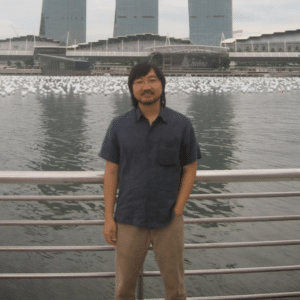
The Japanese word 峠 (pronounced “tor geh”), brings together the Sino-characters for “mountain” (山) (pronounced “shan” in Chinese), “up” (上) (“shang”), and “down” (下) (“xia”). To me, this is the most astonishing word in the language, which I’m currently learning, because, as suggested by its constituent parts, it literally means “mountain pass,” somewhere on an elevation where you can more easily reach an adjoining elevation, and figuratively it then suggests that a peak or crisis point of some kind has been reached, after which things should start to ameliorate. I find the word astonishing because it doesn’t exist in Chinese, where the concept is expressed using two different characters, or, if one is preferred, usually by the Sino-character 关 (“guan”) which means “strategic pass.”
“Tor geh” (峠) in this regard exemplifies in an especially clear fashion what the cultural scholar Mary Louise Pratt calls “extroversion,” that being the fact that languages are “outwardly disposed to seize elements from others with which they come in contact” (1). Starting from the Tang dynasty, Japan had picked up an entire lexigraphic system from the Chinese and––as one does––it then localized it and became creative with its usage. Furthermore, such borrowings go both ways. The Chinese now use the term 腺 (“xian”) to designate a gland or secretory organ, with the character bringing together the morphemes “月” (“yue”), meaning “flesh” or “body,” and “泉” (“quan”), meaning “spring,” “fountain,” or “source,” the two in combination referencing a body-part that produces secretions. As it turns out, however, this compound is actually an orthographic borrowing from the Japanese. It is, so to speak, a returned loan, a Japanese coinage on extant terms. Because Japan modernized earlier than China, it used many such coinages to express the European ideas that it encountered; these were later adopted by the Chinese because they found the renderings practicable. And moreover these are not the only tongues where reciprocal “borrowings” take place. As one commentator points out, “[a] similar process [also] takes place in modern Greek when it ‘reborrows’ words coined in other languages such as English from ancient Greek roots, like cosmonaut κοσµοναυτηζX (kosmonautis) and telegram τηλεγραφηµα (tilegrafima).” (2)
English is, to be sure, full of such borrowings. From Malay, for example, it picked up “amok,” “padi/paddy,” “orangutan”, “rattan”, “parang,” and “pantoum/pantun.” From Hindi, it obtained “jungle” “pyjama,” “bungalow,” “thug,” “loot,” and “shampoo.” Even before it got into the language-contact itinerations that occasioned such borrowings, English (in all its “old,” “middle,” and “modern” period iterations) had, of course, borrowed from nearer home, from Celtic, Germanic, French, Latin, and other European languages.
I bring up this topic because, while it may seem that extroversion is an unremarkable, fairly obvious thing, it is not actually the endorsed view about how language operates. The technical determination that Pratt gives to the word “extrovert” is of recent vintage and stems from comparative literature scholarship. To my knowledge, there doesn’t seem to be an equivalent or cognate term to express the idea in linguistics. The 2014 published book, Borrowed Words: The History of Loanwords in English (3), does not feature the word “extroversion” nor any term semantically equivalent to it.
Instead, the dominant narrative is that languages are hermetic, self-sufficient entities. As a belief system, the dominant weltanschauung “conceives the world as consisting of geographically dispersed common languages each of which has a unique separate identity of its own that is both stable and unitary” (4). Even so, this mindset amounts to an exorbitation of what happened during the eighteenth and nineteenth century. Whereas in the past, Europe was more heterogenous in its formulations about social and political identity, the Romantic era saw a remarkable upsurge in nationalism, with many locales striving for an idealised but never quite achieved congruence between language, culture, and territory; and having visited such a regime on itself, Europe then imposed it by imperial fiat around the world. As linguistic anthropologist Kathryn Woolard points out, “[i]t is a truism that the equation of language and nation is not a natural fact but rather a historical, ideological construct,” one “conventionally dated to late-eighteenth-century German Romanticism and Johann [Gottfried] Herder’s famous characterization of language as the genius of a people” (5).
While extroversion is denied or ignored by mainstream narratives, it strikes me, however, that the phenomenon lies at the heart of what translators do. It is a commonplace that we rely on gut feeling when we translate, that a particular lexical choice or arrangement is appropriate if it “feels” right. One prominent translation scholar has even erected an entire theory based on that somatic consideration (6). Speaking speculatively, I would imagine that various, so to speak, “reciprocal borrowings” have already been made in the mental lexicon of the competent translator, that such borrowings lie at the heart of what happens when we vouchsafe that a particular arrangement “feels” correct, because in essence we are drawing on an enlarged data set made possible by that kind of individual-level extroversion and cross-pollination. In her comments about the phenomenon, Pratt suggests that “[t]his active openness of linguistic systems makes language uncontainable and transgressive.” In a manner of speaking, we could say, translators are the beneficiaries and torch-bearers of this non-Herderian disposition for merger and synthesis. [end]
References
1) Pratt, Mary Louise. “Comparative Literature and the Global Languagescape.” A Companion to Comparative Literature. Ed. Ali Behdad and Dominic Thomas. Malden, MA: Blackwell, 2011. 273–295 (290).
2) Chung, Karen S. “Some Returned Loans: Japanese Loanwords in Taiwan Mandarin.” Language Change in East Asia. Ed. T.E. McAuley. Richmond, Surrey: Curzon, 2001. 161–179 (162).
3) Durkin, Philip. Borrowed Words: The History of Loanwords in English. Oxford University Press, 2014.
4) Holquist, Michael. “What Would Bakhtin Do.” Critical Multilingualism Studies. 2.1 (2014): 6–19 (8).
5) Woolard, Kathryn A. “Introduction: Language Ideology as a Field of Inquiry.” Language Ideologies: Practice and Theory. Ed. Bambi B. Schieffelin, Kathryn Woolard A., and Paul V. Kroskrity, Oxford University Press, 1998. 3–47 (16).
6) Robinson, Douglas. The Translator’s Turn. Baltimore, Johns Hopkins University Press, 1991.

 Wai-chew Sim obtained his BA (Honours) from the University of East Anglia and his PhD from the University of Warwick. His work has appeared in Textual Practice, The Journal of Commonwealth Literature, and CLCWeb: Comparative Literature and Culture. His English translation of Singapore writer Joo-Ming Chia’s sinophone novel, Exile or Pursuit [放逐与追逐] was published by Balestier Press in 2019. Website
Wai-chew Sim obtained his BA (Honours) from the University of East Anglia and his PhD from the University of Warwick. His work has appeared in Textual Practice, The Journal of Commonwealth Literature, and CLCWeb: Comparative Literature and Culture. His English translation of Singapore writer Joo-Ming Chia’s sinophone novel, Exile or Pursuit [放逐与追逐] was published by Balestier Press in 2019. Website
This residency is generously supported by the National Arts Council of Singapore.
You may also like...
Read ‘The Road Taken’ by Wai-chew Sim
Virtual NCW resident Sim Wai-chew has written a creative Walking Norwich commission about unlikely old friends meeting, reflecting on the Second Mayalan Emergency.

9th November 2023
Five top tips for writing for your own enjoyment
Author, editor and NCW virtual resident Tse Hao Guang offers advice to writers hoping to write in a way that’s inventive, surprising and centres their own happiness.

19th September 2023
‘Following Three Rivers’: a commission by Daisy Henwood
‘This project has made me actively love the rivers that flow through my city, and I take more and more notice of those sluggish streams every time I walk through town. This project has also made me love a river that flows through a city ten thousand miles away, that I have never even been to.’

22nd August 2023






